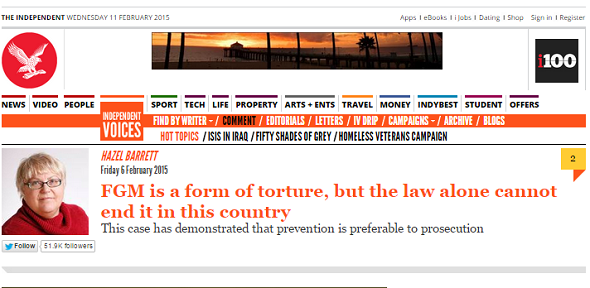REPLACE 2 Project Updates: 6th Feb 2015
Friday 6th February marked International Day of Zero Tolerance for Female Genital Mutilation (FGM) REPLACE 2's Prof Hazel Barrett wrote a piece for the independent about how the law alone cannot end FGM in this country (Click on the image below to read).

REPLACE also had an active presence on social media, released the
8th specialist newsletter and was
featured on CURB (research blog). Hazel attended the inter-ministerial meeting on ending FGM, where in the closing remarks REPLACE 2 was mentioned as an example of how interventions are being evaluated. Hazel was also interviewed by Sky news following the event.
Recent activities
This week REPLACE 2 starts two new behaviour change community based interventions targeting FGM in Spain and Portugal. The intervention is focused on working with communities to enhancing the opportunities, capabilities and motivation of community members to communicate with one another about wanting FGM to end. This month we have also seen FSAN finish delivering their intervention in the Netherlands with Qur’anic school teachers, who have been delivering a lesson about FGM. They are currently in the process of collecting final evaluation data and Dr Katherine Brown will be joining the FSAN team soon for a celebration event.
It’s great to see the REPLACE behaviour change approach being used and cited around the globeProfessor Hazel Barrett attended the CHANGE conference in Berlin last month ‘Promoting change towards the abandonment of FGM in affected communities across the EU’. The morning session was dedicated to the promotion of behaviour change in affected communities and speakers discussed the challenges and opportunities for change and shared their experiences of community interventions. The REPLACE behaviour change approach was used and cited as the basis for the project.
The REPLACE pilot toolkit was named as a promising practice in ‘The Council of Europe Convention on Preventing and Combating Violence against Women and Domestic Violence’ presented at the Istanbul convention.